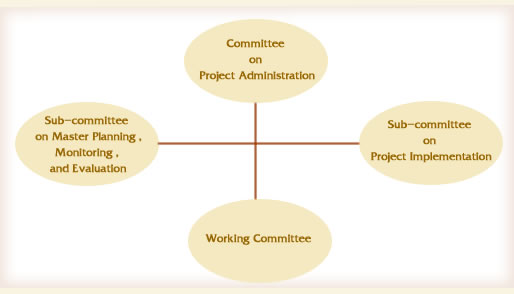Administration and Operation of the Royal Development

In the initial phase of the establishment, the Royal Development Study Centres were operated by the executive committee and subcommittee which had different structures, causing the work implementation of the Centres to be disjointed and lacking unity. Therefore, in order to promote consistency and unity in the implementation of His Majesty's initiatives, the cabinet agreed on January 28, 1992 to adjust the administrative system of the Centres by dissolving all of the existing executive committees and subcommittees and replacing them with only one set of organizational bodies which consists of the Executive Committee and the Masterplanning, Monitoring and Evaluation Subcommittee.
The Royal Development Study Centre Executive Committee comprises heads of concerned agencies both at the central and regional levels. It is chaired by His Majesty's Privy Councillor while the Secretary-General of the Royal Development Projects Board is the vice-chairman. This also involves twelve Director-Generals from the agencies concerned and six governors from the provinces where the Centres are situated serving as the committee. The Deputy Secretary-General of the Royal Development Projects Board serves as the committee and secretary, while the Advisor on Project Coordination and the representatives of the Office of Royal Development Projects Board serve as the committee and the assistant secretary. Altogether there are twenty-three in the committee. The committee has the duty to set the objectives, formulate the policies and shape the target of work implementation. They also set guidelines for operation, control, monitoring and facilitation of project implementation so as to be in accordance with the master plan and the royal initiatives. Moreover, the committee gives suggestions on solutions and obstacles in the operation. They also have the right to appoint any subcommittee or working teams for work implementation.
The Masterplanning, Monitoring and Evaluation Subcommittee consists of representatives from the involved agencies. It is headed by the Secretary-General of the Royal Development Projects Board and five Deputy Director-Generals of the agencies concerned are the vice chairmen. The representatives from nine agencies concerned constitute the members of the subcommittee. The Advisor on Project Coordination of the Royal Development Projects Board is the committee and secretary; whereas the representatives of the Office of the Royal Development Projects Board and the directors of the six Royal Development Study Centres are members of the subcommittee and also assistant secretaries. The Subcommittee is authorized to conduct study and collection of data useful for formulating the Master Plan of each Centre to be compatible with the policies of the Executive Committee. In addition, it monitors the operation, considers the details of the project proposal and budget, as well as guiding the plan towards the goals.
The operation subcommittee and the working team consist of representatives from more than 10 agencies both working at the central and regional levels such as Land Development Department, Department of Agriculture, Royal Forestry Department, National Park, Wildlife and Plant Conservation Department, Department of Livestock Development, Department of Fisheries, the Royal Irrigation Department, Office of the Royal Thai Police, Department of Agriculture Extension, the Cooperative Promotion Department, Department of Social Development and Welfare, etc. The official from the major agency concerned becomes the director of the Centre with the responsibility of monitoring, guiding and coordinating the activities as deemed necessary.
The six Royal Development Study Centres are similar in that they exist in order to conduct study, research and experimentation on the agricultural knowledge which can be applied by the farmers to upgrade their well-being. However, the Centres are different in terms of the focus of study which varies according to the nature of the particular problems concerned.